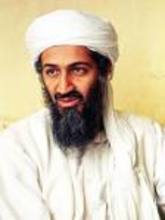 In secretly recorded phone calls that rang through a quiet courtroom, an ex‑U.S. Navy sailor laughs with a friend as a sniper tears U.S. soldiers’ bodies apart, and lauds the “psychological anxiety” wreaked on the USA by his coded hero (pictured), “Under the Black Leaves.”
In secretly recorded phone calls that rang through a quiet courtroom, an ex‑U.S. Navy sailor laughs with a friend as a sniper tears U.S. soldiers’ bodies apart, and lauds the “psychological anxiety” wreaked on the USA by his coded hero (pictured), “Under the Black Leaves.”
“Under the Black Leaves” was a thinly veiled name for Usama (Osama) Bin Laden — the man Hassan Abu-Jihaad was supposed to be fighting with his naval battle group back in 2000 and 2001.
Instead of helping the U.S. fight Bin Laden, government prosecutors charge, the former sailor leaked sensitive information about the Navy’s movements to people involved in a London-based terrorist cell.
Abu-Jihaad, 31, of Arizona, sat quietly in a bright orange prison shirt before Judge Mark R. Kravitz in New Haven U.S. District Court Wednesday as federal prosecutors rolled out phone calls, emails and a star undercover witness to build their case against him. The young ex-sailor, formerly known as Paul R. Hall, was indicted in March on two counts of providing material support of terrorism and giving out classified info related to national defense.
Abu-Jihaad has pleaded not guilty to the charges. His trial is set for Feb. 25. If convicted he faces up to 25 years in prison.
The bulk of the government’s case rests on emails Abu-Jihaad allegedly sent to a London-based organization called Azzam Publications, leaking information about the Navy’s weaknesses and whereabouts.
The case began in 2003, when British law enforcement seized a floppy disk containing leaked Navy info. Azzam’s website had originally been run on servers in Trumbull, Conn., leading the case — and this week’s pre-trial hearing — to the charge of the New Haven FBI.
“Under the Black Leaves”
Prosecutors spent Wednesday adding a slew of statements, many procured by FBI wiretaps, to the case against the ex-sailor. Phone calls were not all directly related to the info leaked to London, but they paint a picture of a fiercely anti-American extremist bent on bringing doom to U.S. forces. Conversations were recorded from October to December of 2006, as part of a separate investigation into a friend named Derrick Shareef — who incidentally pleaded guilty Wednesday to attempting to set off grenades in a Chicago-area shopping mall.
Click here to read a government memo unsealed Wednesday describing conversations and emails.
In one conversation with a friend, Abu-Jihaad praises the “Juba Sniper,” a man who claimed to have killed 37 U.S. soldiers. The friend asks if Abu-Jihaad has seen an internet video where the sniper tears apart the bodies of soldiers.
According to the tapes played in court, Abu-Jihaad says in reverence: “Juba was a cold dude … if he’s still breathing, may Allah still let him be plugging them dudes … If not, I know he done train more … in the skills and tactics that he got … ‘cuz he was laying ‘em down!”
In a 2006 phone conversation, when Abu-Jihaad apparently suspects the FBI is tapping his phone, he decides to start referring to Usama Bin Laden by a thinly-veiled code: “Under the Black Leaves.” Muslims should “bankrupt” non-believers through acts of terrorism, Abu-Jihaad allegedly says, praising the ideology of “Under the Black Leaves.”
Prosecutors also read from an earlier email to London wherein the ex-sailor recommends an article advocating violent jihad. He praises Usama’s latest video for spreading “psychological anxiety” on American forces, and calls the attack on the USS Cole a “martyrdom operation.”
Assistant U.S. Attorneys Steve Reynolds and William Nardini took turns explicating the material.
Undercover Extremist
After lunch Wednesday, the government rolled out its star witness: A guy from New Jersey who shed his life of crime to befriend and betray suspected terrorists. Jameel Chrisman, in a plaid shirt and tight-fitting skull cap, took the stand Wednesday and described conversations he’d had with Shareef the mall-bomber and others.
Chrisman had been convicted of armed robbery and car theft before the FBI recruited him to their side. He was assigned to befriend Shareef, and ended up moving in with him in Rockford, Ill. He posed as an Islamic extremist to gain Shareef’s trust and then record days’ worth of conversations with him. The trail led him back to Shareef’s childhood mentor, Abu-Jihaad.
The government’s using Chrisman’s testimony in part in effort to establish that Shareef and Abu-Jihaad were co-conspirators in a plot to attack a military recruiting station in Phoenix and a military base in San Diego.
Abu-Jihaad’s attorneys, Dan LaBelle and Robert Golger, argue the new statements garnered from Chrisman should not be admitted as evidence. They characterized the statements as a lot of talk that showed jihadists sympathies, but did not prove any conspiracy.
Judge Kravitz has yet to rule on whether the new statements should be admissible. The pre-trial hearing continues Thursday, possibly into Friday.

I hope the Independent continues it reports on the case.